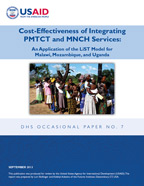- PUBLICATIONS
- JOURNAL ARTICLES
- ACCESS PUBLICATIONS
Publications Summary
- Document Type
- Occasional Papers
- Publication Topic(s)
- HIV/AIDS
- Country(s)
- Malawi, Mozambique, Uganda
- Language
- English
- Recommended Citation
- Bollinger, Lori and Adebiyi Adesina. 2013. Cost-Effectiveness of Integrating PMTCT And MNCH Services: An Application Of The LiST Model For Malawi, Mozambique, and Uganda. DHS Occasional Papers No. 7. Calverton, Maryland, USA: ICF International.
- Download Citation
- RIS format / Text format / Endnote format
- Publication Date
- September 2013
- Publication ID
- OP7
Download
 Cost-Effectiveness of Integrating PMTCT and MNCH Services: An Application of the LiST Model for Malawi, Mozambique, and Uganda (PDF, 802K)
Cost-Effectiveness of Integrating PMTCT and MNCH Services: An Application of the LiST Model for Malawi, Mozambique, and Uganda (PDF, 802K)
